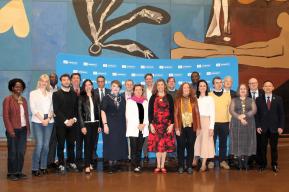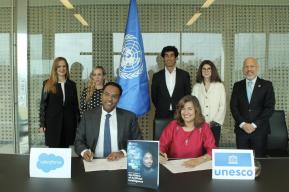News
New UNESCO Chair of Bioethics will reinforce ethics research and education

A newly established UNESCO Chair of Bioethics at the Medical University of Vienna was inaugurated in Vienna, Austria, on 26 January 2016. This is the first such Chair in Austria, and will be led by Christiane Druml, Vice-Rector of the University, Chairperson of the Austrian Bioethics Commission, and former member of the International Bioethics Committee of UNESCO.
“The first step in the evolution of ethics is a sense of solidarity with other human beings.” Christiane Druml quoted from Albert Schweitzer in her inaugural lecture. “This quotation, albeit simple, is in the truest sense of the word a motto for our society, and for this Chair of Bioethics.”
Christiane Druml explained that the Chair will strive to reinforce and increase capacities in the area of ethics research and ethics education. It will work on strengthening ethics capacity in North-South research, and on raising awareness in Europe of the importance of such research. It will also assist UNESCO in supporting newly established national bioethics committees in developing countries, and in further expanding existing networks of researchers and bioethicists in Africa, the Arab States and Asia, and in Europe. In the long-term, it will also work towards strengthening the position of women in bioethics.
Nada Al-Nashif, Assistant Director-General for Social and Human Sciences of UNESCO, stated that “the creation of this Chair is an important step forward in building long-term sustainable bioethical expertise here in Austria, as well as in Europe and around the world, especially at this juncture of unprecedented global challenges of a most demanding complexity.”
She pointed out that the international development community’s 2030 Sustainable Development Agenda enshrines sustainability in a set of ambitious and transformative goals anchored in human rights, targeting universality of application and committing to “leaving no one behind”. A key strategic approach towards the realization of these goals is the harnessing of the power of the sciences for sustainable development and poverty eradication. The push towards better science for a better future must be accompanied by rigorous ethical reflection in order to tackle inequalities, to fight discrimination, and to ensure respect for human rights and dignity.
“Ethics of science and bioethics must be accorded its proper place at the centre of the ongoing dialogue on how we can build sustainable and just societies,” she said, further stating that “it is in this context that we also welcome the creation of this Chair.”







